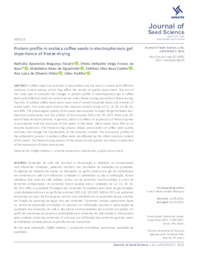Protein profile in arabica coffee seeds in electrophoresis gel: importance of freeze-drying.
Protein profile in arabica coffee seeds in electrophoresis gel: importance of freeze-drying.
Autoria: FÁVARIS, N. A. B.; ROSA, S. D. V. F. da; FIGUEIREDO, M. A. de; COELHO, S. V. B.; VILELA, A. L. de O.; PADILHA, L.
Resumo: Coffee seeds are sensitive to desiccation and are used or stored with different moisture content values, which may affect the results of quality assessment. The aim of this study was to evaluate the changes in protein profile in electrophoresis gel in coffee seeds with different moisture content values under freeze-drying and without freeze-drying. Two lots of arabica coffee seeds were used, one of newly-harvested seeds and another of stored seeds. The seeds were dried to the moisture content values of 12, 15, 20, 25, 30, 35, and 40%. The physiological quality of the seeds was assessed through the germination test, electrical conductivity, and the profiles of the enzymes SOD, CAT, PO, GOT, MDH, and EST and of heat-resistant proteins. In general, there is an effect on expression of these enzymes in accordance with the presence of free water in the seeds. Moist seeds have little to no enzyme expression. The freeze-drying process allows preservation of coffee seed quality and does not change the functionality of the enzymes studied. The isoenzyme profiles of the antioxidant process in arabica coffee seeds are affected by the initial moisture content of the seeds. The freeze-drying process of the seeds ensures greater sensitivity in detection of the expression of these isoenzymes.
Ano de publicação: 2022
Tipo de publicação: Artigo de periódico
Unidade: Embrapa Café
Palavras-chave: Coffea Arábica, Enzymes, Freeze drying, Seeds
Observações
1 - Por padrão são exibidas publicações dos últimos 20 anos. Para encontrar publicações mais antigas, configure o filtro ano de publicação, colocando o ano a partir do qual você deseja encontrar publicações. O filtro está na coluna da esquerda na busca acima.
2 - Para ler algumas publicações da Embrapa (apenas as que estão em formato ePub), é necessário ter, no celular ou computador, um desses softwares gratuitos. Sistemas Android: Google Play Livros; IOS: iBooks; Windows e Linux: software Calibre.
Acesse outras publicações
Acesse a Base de Dados da Pesquisa Agropecuária (BDPA) para consultar o acervo completo das bibliotecas da Embrapa.

